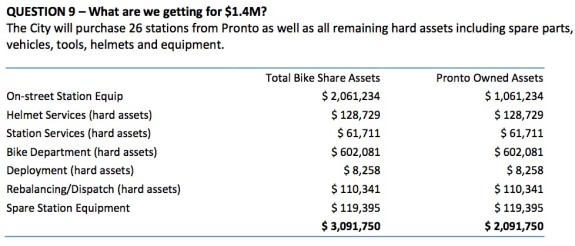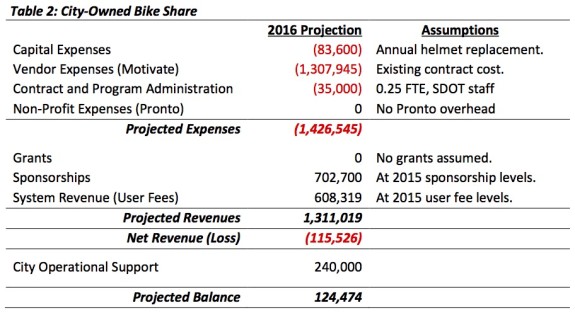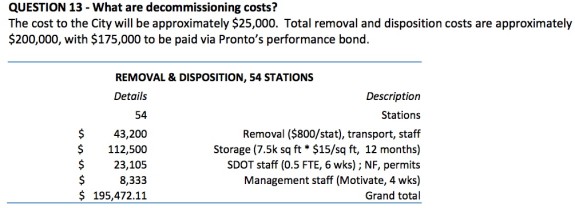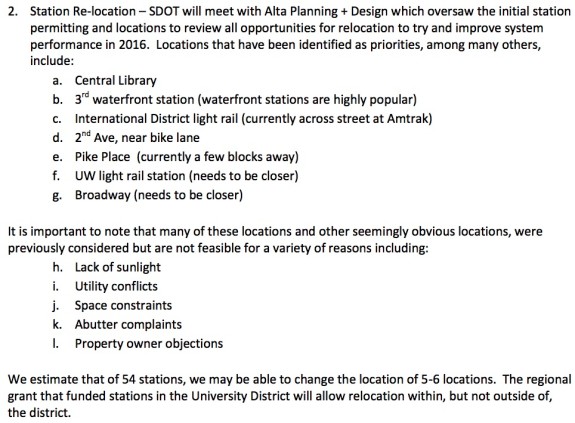Pronto buyout is not only a good deal for Seattle, it’s the only choice that makes sense

Images from City Council documents ahead of the March 1 Sustainability and Transportation Committee meeting.
Sustainability, access to healthy transportation choices, economic development, congestion reduction, innovation. Public bikes grow and support so many of Seattle's goals and values as a city that it's hard to believe we are even thinking about cutting modest losses and liquidating the system at the first sign of challenge.
The City Council's Sustainability and Transportation Committee is preparing to vote on SDOT's Pronto buyout proposal at their 2 p.m. meeting tomorrow (Tuesday). You can voice your support online using this handy form from Cascade Bicycle Club and by testifying in person at the start of the meeting.
The $1.4 million under debate is part of the $5 million buyout and expansion plan the City Council already approved (with conditions) in the fall. Though it feels like an emergency because the timing of the vote is under the gun as the system's non-profit owner faces default at the end of March, the city would have needed to buy the system's assets under any expansion plan. This isn't an unplanned cost, just unplanned timing.
And the deal Seattle is getting is very favorable. For $1.4 million, the city will get $2.1 million in assets, bringing the city's total bike share assets up to $3.1 million. But even better, the city would get a functioning bike share system already in operation complete with a valuable team of sponsors, 3,300 annual members and all the hard-to-measure marketing and habit-building investments already made. Like with any business, it costs money to get bike share customers, and the city is basically getting that existing customer base value for free.
 Despite ridership numbers lower than projections, Pronto is not a failure. Both SDOT and an independent budget analysis by City Council staff found that a city-owned Pronto system would run about $115,000 over budget assuming no growth in ridership or sponsorships.
Despite ridership numbers lower than projections, Pronto is not a failure. Both SDOT and an independent budget analysis by City Council staff found that a city-owned Pronto system would run about $115,000 over budget assuming no growth in ridership or sponsorships.
Closing that funding gap is hardly a moonshot. The city just needs to sell ten station sponsorships. Or it needs to add another 1,300 members to its current 3,300. Or attract 14,000 more day-pass users. Or (more likely) any combination of these sources of income.
 In fact, it would cost more to decommission the system than it would to keep it running while the city plans a 2017 expansion (though the city would only pay part of the decommissioning cost).
In fact, it would cost more to decommission the system than it would to keep it running while the city plans a 2017 expansion (though the city would only pay part of the decommissioning cost).
Get some confidence, Seattle, we can make this system work. From major planned bike network improvements (especially downtown) to major transit expansions, so many pieces are about to come together.
U Link stations opening in 19 days on Capitol Hill and UW may do the lion's share of work to close that funding gap on their own, since nearby public bikes will become that much more useful. There is no way we're going to close bike share the same month these new light rail stations finally begin operations, right? This is the moment bike share has been waiting for.
I apologize in advance, but I'm going to use a baseball metaphor. Ditching Pronto now would be like laying down a bunt on the first pitch that goes foul. Then instead of trying again, you quit because you didn't hit a home run. As we have reported, Pronto's limited size and split system was doomed to come up short. The answer isn't to give up, we need to give it the effort it needed from the start.
But Councilmember Lisa Herbold (D1, West Seattle) is planning an amendment to prevent a city buyout of Pronto, would set aside $1 million of the approved $5 million budget to repay the Federal grant (she didn't speak with the County about their state grant liabilities). The remaining $4 million would be directed to other unspecified bike improvements, she said.
Basically, she's not against bike share, she said, she's just against the city owning bike share.
"But [the amendment] also states support for wholly privately-owned bike share," she told the City Council Monday in a preview of Tuesday's committee meeting and vote.
While letting the private sector launch its own bike share sounds great, the city buyout is the only plan to keep Pronto alive. Pronto General Manager Demi Allen told the Council during testimony February 19 that Motivate is open to taking on financial responsibility for the system, but only if the city expands it to a more sustainable and appropriate size (at least double what it is today).
If we sell off all the existing assets as described above and pay back grant funds, nobody is going to magically launch a brand new profitable bike share system. In reality, we will be simply giving up before we even really tried.
And as we have discussed previously, the value of city ownership is that bike share can be operated as a public good like transit rather than just a money-making scheme centered around wealthier and likely more touristy parts of town. In fact, if bike share is ever going to reach West Seattle (or Rainier Valley or Bitter Lake), it's probably not going to come from a profit-driven company.
That's a District 1 amendment I'd like to see: In addition to the near-term expansion plan, what is the city's long-term plan to reach even more of the city including West Seattle?
A path forward with more Council oversight
Yes, those last two are typos: Should be 2017.
"I'm moving toward supporting" the city buyout of Pronto, said Councilmember Mike O'Brien Monday. But he's proposing a series of his own amendments that would give Council more of a role in drafting and reviewing the expansion process.
SDOT plans to put together a Request for Proposals in April outlining the system expansion the city wants to see and giving all operators a chance to bid on the contract. Bidders would submit plans by the end of July, and the city would award the contract in August, according to the timeline. This would set the expansion up for a June 2017 launch.
O'Brien basically wants all these steps to go through the Council, a sign that the Council doesn't fully trust SDOT to handle the process on their own. And given the rough transition process that helped get us into this mess, that concern makes sense.
Council oversight of the RFP process should also ease fears about any conflicts of interest SDOT Director Scott Kubly has with Motivate (he was President of Alta Bicycle Share before joining SDOT and before Alta was bought by Motivate, Pronto's operator). He maintains that he has no financial stake in whether Motivate of another company gets the contract.
And though conspiracy and corruption is a sexier angle, Kubly's deep experience with bike share could also be seen as an asset as the city prepares a renewed bike share launch. He played a major role in systems in Chicago and Washington DC, and should be able to help Seattle's system succeed, as well.
Making our existing system work betterSDOT has also outlined plans to help the existing bike share system work better this year by working to better place stations. They outlined this plan in a slide prepared for tomorrow's committee meeting:
 This is great news, and perhaps a hidden benefit of city ownership of the system: Seattle has more ability to negotiate station locations (like, say, in Westlake Park or the Central Library plaza) than a third party.
This is great news, and perhaps a hidden benefit of city ownership of the system: Seattle has more ability to negotiate station locations (like, say, in Westlake Park or the Central Library plaza) than a third party.
Keep your eye on the ball, Seattle (again, I'm really very sorry for the baseball metaphors). Bike share is awesome, and it could so easily be so much better. It's not a total failure just because the first year didn't go according to the planning document's projections or because the city's frustrating bureaucracy failed to transition ownership smoothly or because the city didn't win the competitive Federal grant it applied for. We're trying to build a whole new public transportation system here, a healthy 24-hour service closing gaps and extending the reach of our major transit investments. This is more than worth our effort, and certainly worth the funds we've already budgeted to make it work better.
UPDATE: Councilmember Herbold sent a lengthy email about her Pronto amendment to people who contacted her about the issue. In it, she questions the value of public ownership of bike share, an issues we touched on above. She also suggests a path where Puget Sound Bike Share goes bankrupt and the city picks up the assets at a lower price. I don't know bankruptcy law enough to know how realistic this plan is or what negative repercussions might come from such a choice, but it's a definitely an idea we haven't heard yet. Here's an excerpt from her email:
The real issue appears to be this: should the public own bike sharing? In practice, if Seattle purchases Pronto, it will become a part of our transportation network, which could result in additional ongoing costs. SDOT projects it would pay for itself, in part through sponsorships, though it's worth noting sponsorship projections for the South Lake Union streetcar fell well below original projections and Pronto's business model failed due to being undercapitalized and realizing less sponsorship revenue than needed; sponsorships will also likely be needed for Waterfront re-development, and any potential Center City Streetcar. It's worth asking whether there is a limit to how much overall sponsorship funding Seattle can realistically attain.
A final note: while a publicly-owned system isn't my preferred outcome, I recognize many do support that. However, I wonder if the legislation before us is the best deal available to Seattle for a publicly owned system. If these amendments pass, or the Council votes no on the legislation, the parties involved would face different bargaining positions: Pronto would face insolvency at the end of March, and a shutdown of operations; Key Bank would face the prospect of $1.275 million not being repaid; and Motivate could lose their potential advantage of having a system already in place during an RFP process. This could dramatically reduce the cost to the public to acquire the bankrupted company's assets.
It's possible that scenario could result in a different proposal for public ownership than the one before us now, which could result in a better deal for Seattle. And, as noted in the Central Staff memo, Council saying "no" to purchasing Pronto does not limit SDOT's ability to proceed with an RFP for a different bike-share system, using any or all of the potential ownership models.
UPDATE 3/1: Councilmember Tim Burgess announced a somewhat similar plan.